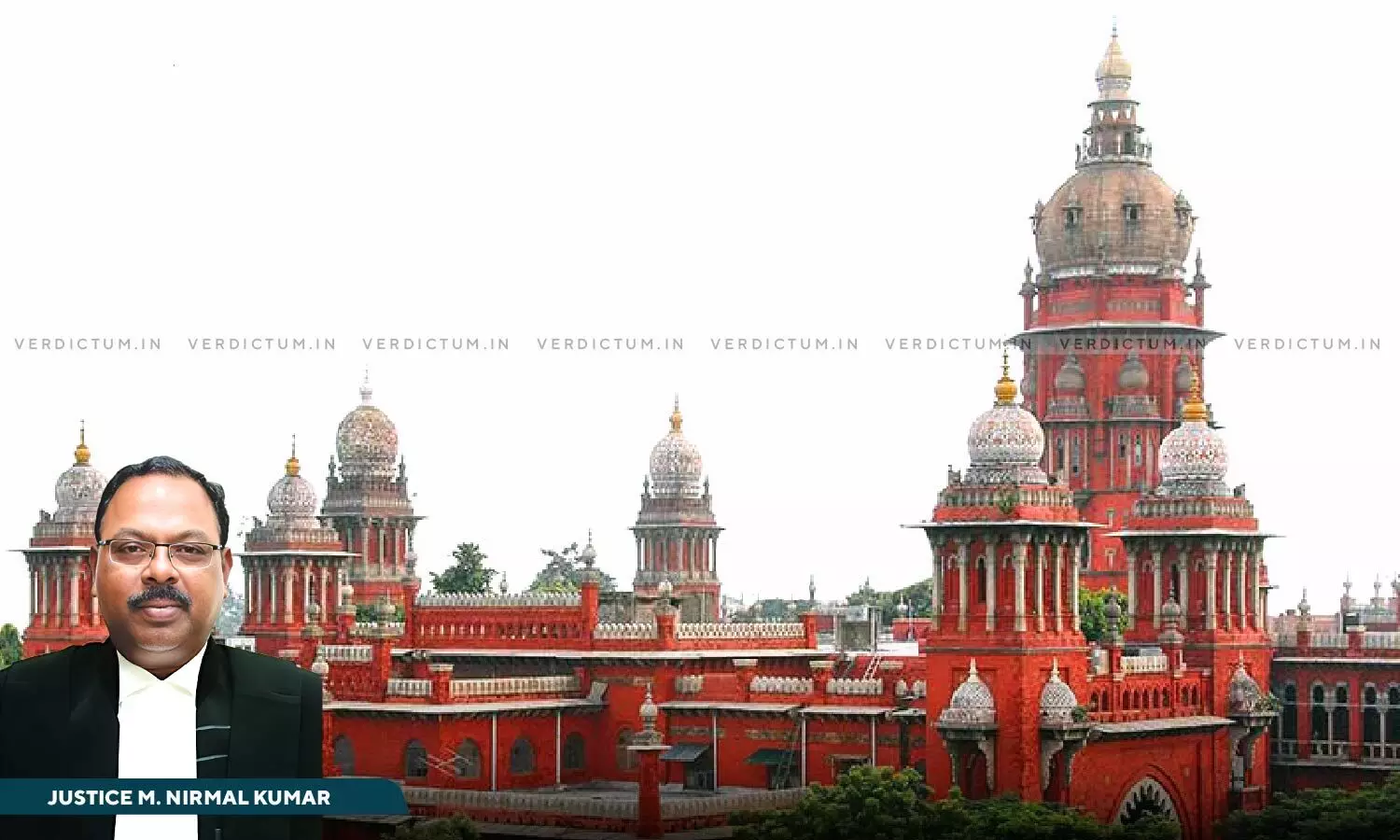
Family Courts Not To Insist Physical Presence Of Spouses While Presenting Petition At First Instance & For Future Hearings: Madras HC Directs
 |
|The Madras High Court has directed that the Family Courts shall not insist physical presence of spouses while presenting the petition at the first instance and for future hearings.
The Court was dealing with a criminal revision petition filed by the estranged wife, seeking a direction to the Principal Family Court, Chennai to number the unnumbered application filed under Section 13-B of the Hindu Marriage Act, 1955 (HMA) seeking divorce by mutual consent.
A Single Bench of Justice M. Nirmal Kumar ordered, “This Court coming to such finding, the following directions are issued in respect of filing of petitions, hearing the parties, recording of evidence under Order XVIII Rule 4 and allied provisions of C.P.C. in a cases filed under Section 13-B of Hindu Marriage Act:
(i) The Family Courts henceforth not to insist physical presence of the petitioners/spouses at the time of presenting the petition at the first instance and for future hearings;
(ii) Petitions can be filed either by the parties directly or by the Power of Attorney of the parties, provided, the Power of Attorney to be a registered one or properly adjudicated;
(iii) On behalf of the parties, Power of Attorneys can appear and prosecute. The only embargo is that the recognised agent should not be a legal practitioner;
(iv) The Power of Attorney representing the parties shall present the petition with relevant documents annexed, materials and proof affidavit required for the case in physical form;
(v) The parties can be present through virtual mode from their respective places and the place of location, identity of the person to be confirmed with relevant documents;
(vi) The Court can verify with the parties appearing through virtual mode as to the petition, proof affidavit, documents produced and record the same as evidence on satisfaction and to pass appropriate orders."
Senior Advocate V. Prakash represented the petitioner while Advocate Revathi G. Mohan represented the respondent.
Factual Background -
The petitioner’s contention was that the marriage between her and her husband (respondent) was solemnised in 2016 according to Hindu rites and customs and thereafter, they lived in USA. During the course of their marriage life, they had some differences and they tried their best to workout and resolve the issue. They were not able to live together as spouses anymore and their marriage broke down. Therefore, they got separated and were living separately since 2021. They agreed to amicably dissolve their marriage through mutual consent. The petitioner came down from USA to Chennai to file the mutual consent divorce petition. Since the respondent could not travel to India due to visa renewal issues, he filed a petition to be represented by his power agent i.e., his father and also filed a petition to appear before the Family Court through video-conferencing.
Six months thereafter, the case was posted for hearing in November 2023. Since the visa issue pertaining to the respondent could not be resolved and he was unable to travel to India, the case got adjourned to January 2024. Thereafter for the same reason it was again adjourned to February month. Finding that the mutual divorce petition getting stalled on technicality, the petitioner approached the High Court. The Court permitted the respondent to appear through video-conferencing but thereafter, all interim applications and power of attorney got returned. The presence of the petitioner and respondent through video-conferencing marked but the parties were not permitted to record their evidence, since they not appeared through consulate. The case was not adjudicated and progress of case got stalled and in view of such constraint, the petition was filed.
The High Court in the above regard, observed, “The presence of coordinator at the remote site is mandatory, required only when a person accused of an offence is to be examined meaning in criminal cases, coordinator presence is mandatory. As regards other cases, it is not a mandatory requirement for a coordinator in the remote site, more so in cases of divorce by mutual consent.”
The Court noted that, virtual proceedings provide an opportunity to modernise the system by making it more affordable and citizen friendly, enabling the aggrieved to access justice from any part of the country in the world.
“Thus the Family Court to ensure that such a system of conducting the proceedings through video conferencing is put to usage without insisting the presence of petitioner even from the time of first presentation till the conclusion of proceedings. The Family Court henceforth not to raise technical objections and insist on physical appearance of petitioner/parties at any stage”, it added.
The Court said that in the case of petitions filed under Section 13-B of HMA for divorce by mutual consent, the Court is to see whether they have got separated, there is no chance for reunion, whether mutual consent is not obtained by force, fraud or undue influence and these can be verified from the petition filed and enquiring the petitioners, who appear through virtual mode.
“The role of the Court in dealing with 13-B petition is limited. Hence, this Court finds the technical objections raised by the Principal Family Court, Chennai and not entertaining the petition and plea of the petitioners not proper, unreasonable and unsustainable”, it concluded.
Accordingly, the High Court allowed the petition and issued necessary directions.
Cause Title- ABC v. XYZ
Appearance:
Petitioner: Senior Advocate V. Prakash, Advocates V. Chethana, M. Karthikeyani, and Rahul Jagannathan.
Respondent: Advocate Revathi G. Mohan